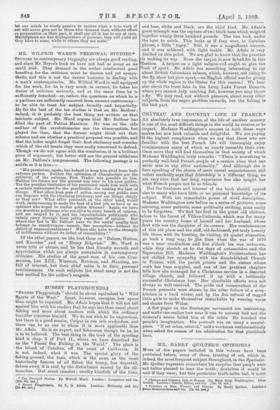MR. WILFRID WARD'S PERSONAL STUDIES:* STUDIES in contemporary biography are
always good reading, and since Mr. Bryce's book we have not had as many as we could wish. They demand in the writer intellectual good breeding, for the criticism must be sincere and yet sympa- thetic, and this is not the easiest business in dealing with .a man's contemporaries. Mr. Wilfrid Ward is well equipped for the work, for he is .very much in earnest, he -takes his duties of criticism seriously, and at the same time he is sufficiently detached—or, rather, the questions on which he is a partisan are sufficiently removed from 'current controversy— to be able to treat his subject broadly and impartially. By far the best of the ten studies is that on Mr. Balfour ; indeed, it is probably the best thing yet written on that intricate subject. Mr. Ward argues that Mr. Balfour has 'filled the part of Fabius Maximus. He was on the side meither of the revolutionaries nor the obscurantists, but played for time, that the former might think out their scheme and see whether a practical proposal was possible, and that the latter might forget their first obstinacy and consider which of the old tenets they were really concerned to -defend. Though we do not agree with the conclusion, it is a brilliant piece of argument ; but better still are the general criticisms on Mr. Balfour's temperament. The following passage is as subtle as it is true:— " His pessimism, again, has helped to keep him aloof from both extreme parties. Neither the optimism of Chamberlain or the optimism of the extreme Free Trader was possible to him. Neither the future nor the present was ever in his eyes golden. Yet the peculiar limitation of his pessimism made him work with a certain enthusiasm for the practicable—for making the beat of things. What other keen man of action among our public men can dispense with the idealising tendency, and see things simply as they are ? What other pessimist, on the other hand, would work, endeavouring to make the best of a, bad job, as hard as an optimist who hopes to realise golden dreams? Again, we have our sensitive politicians who are alive to every breath of opinion, and are swayed by it, and our imperturbable politicians who calmly carry through their policy regardless of opinion. But where else but in Mr. Balfour have we the useful quality that belongs to sensitiveness—namely, fine perception—without its defect of impressionableness ? Where else have we the strength of indifference without its defect of insensibility?"
Of the other papers, we like best those on "Delane, Hutton, and Knowles" and on "Henry Sidgwiok." Mr. Ward is never trite or obtuse, and he has that friendly warmth and appreciation Whioh are always acceptable in contemporary criticism. His studiee of the great men of his own Com- munion, Leo XIII, Wiseman, Newman, and Manning, are full of interest, but their OW value is in their personal reminiscences. On such subjects the abort essay is not the best method for the author's exegesis.










































 Previous page
Previous page